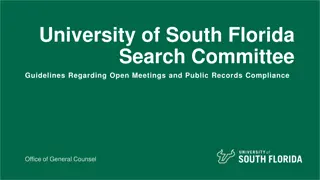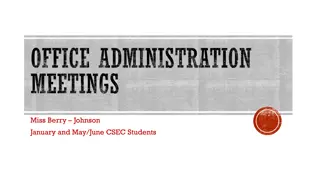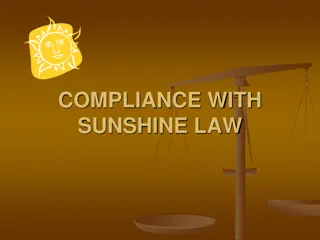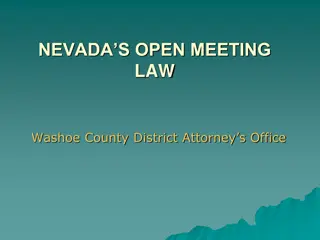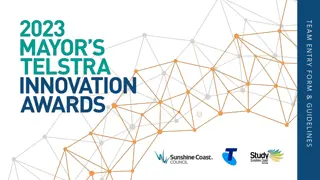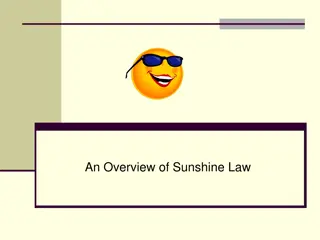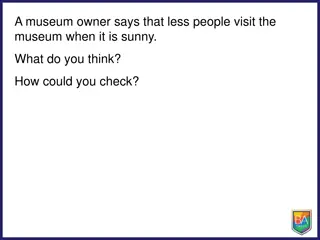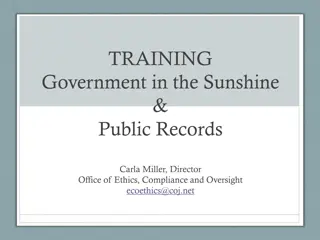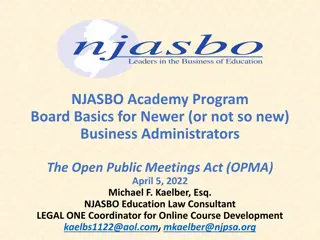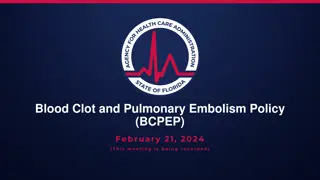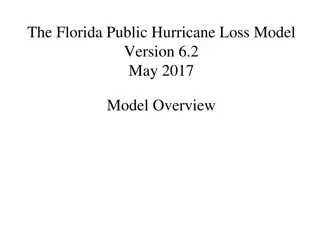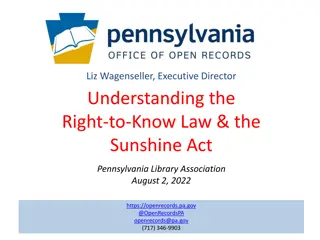Understanding Florida's Sunshine Law and Open Meetings
Florida's Sunshine Law encompasses the Open Meetings Law and the Public Records Law, ensuring transparency in government proceedings. The Open Meetings Law requires meetings of elected boards to be open to the public, with strict requirements for notice, notes, and public access. Discussions between senators or committee members are considered meetings, with specific rules on voting and public participation.
Download Presentation

Please find below an Image/Link to download the presentation.
The content on the website is provided AS IS for your information and personal use only. It may not be sold, licensed, or shared on other websites without obtaining consent from the author. Download presentation by click this link. If you encounter any issues during the download, it is possible that the publisher has removed the file from their server.
E N D
Presentation Transcript
Government in the Sunshine and UNF Student Government MARC SNOW MARC SNOW ASSOCIATE GENERAL COUNSEL ASSOCIATE GENERAL COUNSEL
What is Floridas Sunshine Law? The law consists of two areas: The Open Meetings Law (Chapter 286, Florida Statutes) which provides that meetings of an elected board or commission are open to the public; and 2. The Public Records Law (Chapter 119, Florida Statutes) which creates a right of access to records made or received in connection with official business of a public body. 1.
The Open Meetings Applies to: The Open Meetings Applies to: All meetings of the Senate, or any of its committees or members at which official acts are to be taken are declared to be public meetings open to the public at all times. --Florida Statutes, Chapter 286.011 (1)
What Constitutes a Meeting? Any discussions or deliberations, formal or casual, between two or more senators or covered committee members about a matter in which it is foreseeable that the Senate might take action. Meetings include any workshops, telephone conversations, e-mail or text communications, or other interactions where covered material is exchanged, including social gatherings.
Requirements for Open Meetings 1. Must Provide Reasonable Notice of the Meeting; That Notes be Taken; and That the Meeting be Open to the Public. Section 286.011(1) and (2), Florida Statutes
Additional Open Meeting Requirements No secret ballots, but no roll call is required. All Senate or Committee members attending a covered meeting must vote, unless they declare a conflict of interest. The minutes must reflect a vote for each member.
While Open, No Right to Participate While the public has a right to attend and observe a public meeting, the law does not provide the right for the public to participate in the meeting. The Senate President or Committee Chair, at his/her discretion, may permit members of the public to address the Senate or Committee; however, the Senate President or Chair may limit the number of individuals that speak and place time limits on how long they are allowed to talk.
Providing Reasonable Notice Must give notice at such time and in such a manner that will enable interested persons and the general public a reasonable time to decide whether to attend the meeting. As a general rule, less than 48 hours notice would not constitute reasonable notice.
Who in SG does this Apply to? Senate meetings Meetings of the 4 standing committees 1. Budget and Allocations 2. Constitution and Statutes 3. Student Advocacy 4. Elections, Selections and Appointments Meetings of the Judiciary Any Appointed Advisory Committee
Who in SG Does this Not Apply to? Meetings of the 4 Executive Agencies 1. Osprey Productions 2. Club Alliance 3. African American Student Union 4. Volunteer Center Meetings between the President and his/her Cabinet
Public Records Public records means all documents, papers, letters, maps, books, tapes, photographs, films, sound recordings, data processing software, or other material, regardless of the physical form, characteristics, or means of transmission, made or received pursuant to law or ordinance or in connection with the transaction of official business by any agency. --Chapter 119.011 (11), Florida Statutes
Floridas Public Records Law has a Very Broad Interpretation Virtually, any document created, received or maintained by Student Government and its representatives acting in their official Student Government capacities is considered a public record and is subject to inspection by the public.
Public Records may be Accessed via a Public Records Request These requests can be: Verbal Written E-mailed Made by any person for any reason.
What a Requestor is Entitled to Chapter 119, F.S. creates a right of access to records made or received in connection with official business of a public body. The requestor can inspect and copy any public record which is not exempt from disclosure. A requestor s motive is irrelevant and they do not have to tell you why s/he wants the records.
If You Receive a Request for Public Records, Do the Following: Immediately notify the SG Advisor of the request. Remember -- records custodian has a reasonable time to respond so make sure you know what to provide the requestor. Determine whether exemptions apply to the records requested. Determine whether there will be a need to redact confidential information from the records to be produced.
Additional Issues to Consider Records custodian may charge for the cost of duplication ($.15 per copy, $.20 for double-sided copies and $1.00 per certified copy) and if the request is voluminous, the cost of labor for retrieving and redacting records Whether the request may be subject to a special service charge . For example, most requests for email involve charging a special service charge because of extensive use of ITS resources.
Confidential Records That are Exempt From Disclosure: Student records under FERPA Social Security numbers Medical information Employee disciplinary records while discipline is in process
What is Not Required When Responding to a Public Records Request No requirement to create records. No requirement to provide records in the format requested. No requirement to meet requestor s timetable . No requirement to provide information not in the records. No requirement to explain the records.
Record Retention Requirements Must be maintained in accordance with retention schedules promulgated by the state librarian. The Secretary of State publishes a handbook called The Basics of Records Management Handbook http://www.dlis.dos.state.fl.us/barm/handbooks/basics.pdf Most records must be maintained for 3 years.
Questions? Further information regarding Florida s Government-in-the-Sunshine law can be accessed on UNF s Office of the General Counsel s website in the FAQ area. Also, feel free to contact Marc Snow in the Office of the General Counsel at 620-2866.






